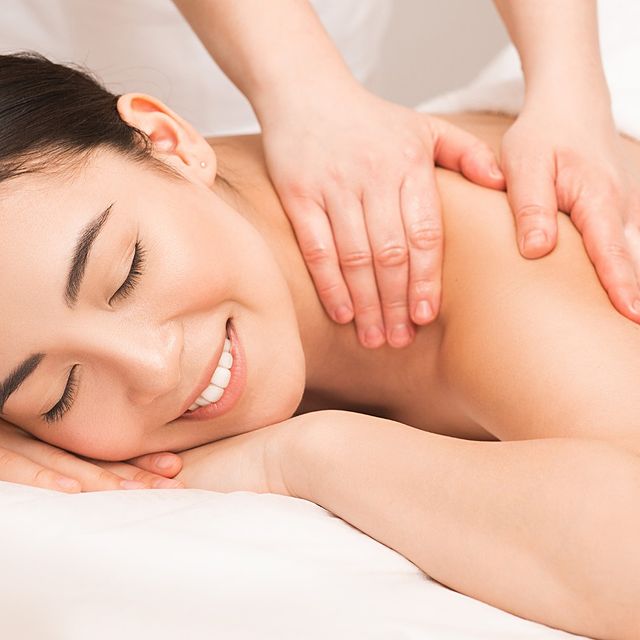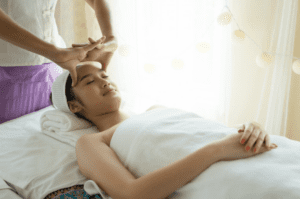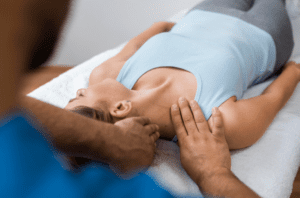Introduction: Therapeutic Massage for Anxiety
The benefits of therapeutic massage for anxiety treatment have been demonstrated by a 2010 study published in Depression and Anxiety.
On the Hamilton Anxiety Rating Scale (HAM-A), the study subjects who got massage therapy displayed noticeably fewer signs of anxiety daily about numerous elements of life that are constant, severe, and uncontrollable a symptom of generalized anxiety disorder.
Tense muscles, agitation, and difficulty sleeping are typical physical symptoms of this condition. An individual’s everyday functioning capacity and general quality of life may suffer.
In this blog, we will learn how Generalized Anxiety Disorder can be treated with anxiety massage. In the end, we will also recommend you the best North Vancouver massage therapists!
Understanding Generalized Anxiety Disorder (GAD)
GAD is characterized by persistent anxiety over every facet of life, including work, relationships, and everything. It transcends the problems that we all have in common.
Exploring Non-Pharmacological Treatment Options
In addition to conventional drugs, there are various GAD treatment options. At this point, therapeutic massage is a comprehensive strategy for inner peace and tranquillity.
Even though this website mainly showcases attractive ladies between the ages of 25 and 50, it’s crucial to understand that we believe therapeutic massage benefits everyone, regardless of age or gender.

What is Therapeutic Massage?
People have utilized therapeutic massage as a hands-on technique for healing and relaxation since the dawn of time.
To improve one’s physical and emotional health, one must work on the body’s soft tissues, including the muscles, tendons, ligaments, and connective tissues.
Therapists use a range of pressures and techniques to relieve particular locations of tension or discomfort, promote relaxation, and improve general health.
Types of Therapeutic Massage Techniques
Let’s explore some of the types of therapeutic massage techniques:
Swedish Massage
One of the most well-liked therapeutic massage techniques, it is distinguished by lengthy, flowing strokes, kneading, and circular motions. Swedish massage aims to calm the body down, improve circulation, and foster well-being.
Deep Tissue Massage
Reaching deeper layers of muscles and connective tissues is the primary goal of this approach. It uses slower, more vigorous strokes to relieve chronic tension, lessen pain, and increase mobility.
Trigger Point Therapy
Muscles might have tight, sensitive spots called trigger points. Trig point therapy involves delivering focused pressure to specific areas to relieve pain and unwind tense muscles.
Shiatsu Massage
Shiatsu massage, which has roots in Japan, works the body’s pressure points by applying pressure with the fingers, palms, and thumbs. It seeks to enhance energy flow and reestablish balance in the body, encouraging rest and recovery.
Thai Massage
This traditional massage incorporates acupressure, yoga-inspired movements, and light stretching. Thai massage promotes relaxation and well-being, increases flexibility, and harmonizes energy.

How can Therapeutic Massage for Anxiety Benefit Mental Health?
Therapeutic massage has several advantages for mental and emotional well-being and physical relaxation. Here are a few ways that receiving therapeutic massage might benefit your mental health:
Stress reduction
It will aid in relaxation, lowering stress hormone levels like cortisol and promoting calmness and peace.
Relief from Anxiety and Depression
The symptoms of anxiety and depression are lessened with anxiety massage because it promotes the production of endorphins, the body’s naturally relaxing “feel-good” hormones.
Improved Sleep Quality
Easing physical discomfort, encouraging relaxation, and easing muscle tension, can aid in getting a better night’s sleep. This results in more restful sleep patterns.
Increased Self-Consciousness and Improved Mind-Body Connection
A therapeutic massage can improve the mind-body connection by assisting you in becoming more aware of the messages and sensations coming from your body.
Also Read: Therapeutic vs Deep Tissue Massage
How can Therapeutic Massage help with GAD Symptoms?
Now let’s know if therapeutic massage can help with GAD symptoms:
Relaxation and Stress Reduction
The massage for anxiety is to provide profound peace and relieves stress is one of its main advantages.
The repetitive movements, kneading, and gentle pressure employed in massage therapy trigger the body’s relaxation response, which calms the nervous system and reduces the release of stress chemicals.
This can ease GAD’s anxiety and tension, fostering a sense of calm and tranquility.
Promoting Sleep Quality
Sleep difficulties and GAD frequently coexist, making it challenging to get enough restorative sleep.
Therapeutic massage can help with this issue by improving sleep quality by promoting relaxation, and lowering anxiety levels.
Massage can aid in more refreshing and rejuvenating sleep by reducing muscle tension and inducing deep relaxation.
Easing Muscle Tension and Physical Discomfort
GAD symptoms include tense muscles, headaches, and physical aches. Massage therapy relieves physical discomfort by working directly on the muscular system to release tension.
Tight muscles can be relaxed, knots can be removed, and various massage treatments can reduce pain.
Reduced muscle tension can lead to a general feeling of ease and relaxation, which can favor your mental health.
Enhancing Mind-Body Connection
Muscle tension, headaches, and body aches are a few symptoms of GAD. Massage therapy releases tension and reduces physical discomfort by working directly on the muscular system.
It is possible to loosen knots, relax tight muscles, and reduce pain using different massage techniques.

Precautions and Considerations of a Therapeutic Massage for Anxiety
Before the therapeutic massage, one must be informed of specific precautions and concerns to ensure a secure and satisfying encounter. The following are some essential considerations:
Potential Side Effects or Discomfort
Even though therapeutic massage is generally risk-free, it is possible to encounter some adverse effects or brief discomfort. Some examples are mild discomfort, bruising, or sensitivity in the treated regions.
Massage Therapy Contraindications
Below are some problems for which you have to consult a doctor first:
- Open wounds or recent injuries
- Severe or uncontrolled hypertension
- Skin infections or contagious conditions
- Certain skin conditions or sensitivities
- Pregnancy (specific prenatal massage may be appropriate)
- Recent surgeries or medical procedures
Seeking Professional Advice
Choosing a qualified massage therapist who is aware of your specific needs and medical conditions is essential. Find a trained, licensed professional who has handled cases of anxiety or mental health problems.
You may also make an informed decision by reading reviews or seeking advice from dependable sources.
Conclusion: Massage for Anxiety
Patients with GAD can gain various advantages from therapeutic massage, such as relaxation, improved sleep, relief from muscle tension, and a greater bond between the mind and body.
Massage’s potent calming effects and focus on anxiety’s physical manifestations can help your therapy strategy.
But it’s crucial to use therapeutic massage and seek expert advice sensibly. Never be afraid to express worries to your massage therapist, especially if you feel uneasy or experience medical problems during or after the session.
If you have concerns about whether massage treatment is suitable or secure for you, speak with your doctor.
At Spa Utopia, Vancouver spa hotel, our skilled therapists are trained to provide specialized therapeutic massages tailored to the unique needs of individuals with GAD.
Experience the soothing benefits of massage therapy and embark on a path toward improved well-being and anxiety relief.
FAQ’s on Massage for Anxiety
While therapeutic massage can provide relief from anxiety symptoms, it is not a cure for GAD.
In general, Massage for Anxiety is safe for most individuals. However, informing your massage therapist about any specific health conditions or concerns is important to ensure a safe and tailored experience.
The number of sessions needed varies depending on individual circumstances. Regular sessions are often recommended, but discuss your specific needs with a massage therapist for personalized guidance.
While rare, some individuals may experience temporary soreness, fatigue, or emotional release after a massage. These effects are generally not very serious.
Look for licensed massage therapists with experience working with individuals with mental health conditions. Seek recommendations from healthcare professionals or trusted sources, and inquire about their training and certifications.





